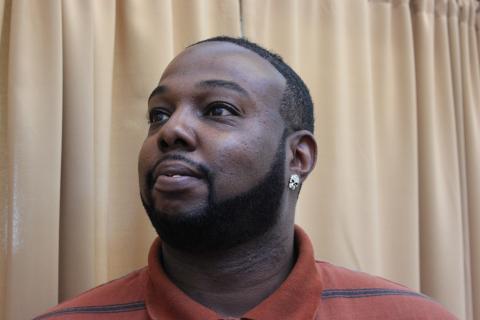
"Am I Asking Too Much?"
Keith Evans served over four years of a ten-year sentence for selling heroin. He's back out and looking for a job in Baltimore.
In this piece for our series "The Lines Between Us," he tells his story about trying to get a "second chance" and become "a citizen again."
Keith, who we met thanks to Andrea Harrison at theJericho Reentry Program, is one of thousands who have reentered Baltimore from prison in the past few years. Here are some numbers that illustrate the disparities in our criminal justice system.
If you’re reentering society after a prison sentence in Maryland, there’s a nearly 8 out of 10 chance you’re black, according to the most recent data in a 2003 study.
In Baltimore, it’s 9 out of 10, plus a 30 percent chance you’re going back to just one of six poor city neighborhoods.
In 2011, 8.7 percent of white Americans reported using illicit drugs in the past month. For black Americans it was 10.0 percent, for Hispanics, 8.4 percent. Not much of a difference.
However, blacks and Hispanics accounted for about two-thirds of all Americans in state prisons for drug offenses, despite making up less than one-third of the population.
Have you ever been convicted of...
It only took a few seconds for Governor Martin O'Malley to sign the legislation into law earlier this month, but it took a four-year struggle for a the 'ban the box' bill to pass.
The 'box' appears on job applications next to the question “Have you ever been convicted of a crime?”
As of October 1, the box will not appear on state job applications.
Even with the passage of this legislation, several employment obstacles remain for the thousands of ex-offenders who are released into Baltimore City every year.
In this interview, Sheilah Kast is joined by Caryn York, the lead policy associate on re-entry issues for the Job Opportunities Task Force, Trina Selden, the executive director of Out For Justice, and Gerald Grimes, the project manager for The Re-entry Center at the Northwest One-Stop Career Center.
Kast and the guests discuss how ex-offenders confront the stigma of incarceration, the underlying disparities that disqualify ex-offenders from a competitive workforce, and ex-offenders' economic mobility.
What Does It Take To Get A Clean Slate?
As we heard in the first half of our show, the impact of a criminal conviction can echo into the future for years. But, how long should it follow you? And, what should employers and landlords know about your past?
Those are the central questions surrounding shielding laws, which keep certain crimes hidden from public view, and expungement laws which remove them from records completely.
Tom Hall talks with Caryn York, who we heard from earlier in the hour. She is Policy Associate at the Job Opportunities Task Force. Mary-Denise Davis joins us as well. She works in the Baltimore City’s Office of the Public Defender.
For more of these stories, head over to Maryland Morning.